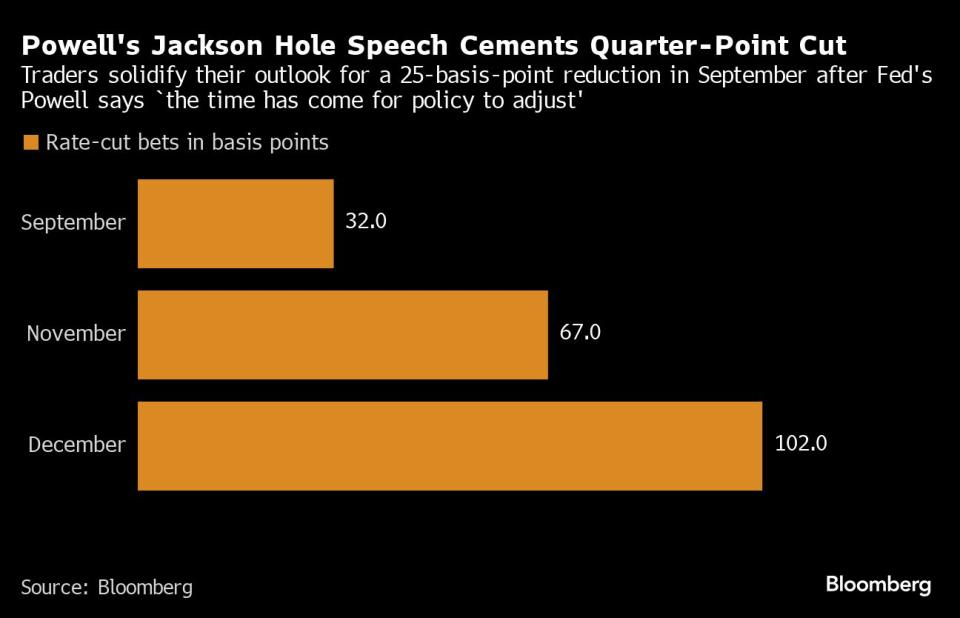Stocks Pause as Mideast Tension Damps Bullish Mood: Markets Wrap

(Bloomberg) -- Stocks paused on Monday as rising tension in the Middle East tempered the bullish sentiment sparked by the prospect of imminent Federal Reserve interest rate cuts.
Most Read from Bloomberg
Sydney Central Train Station Is Now an Architectural Destination
Nazi Bunker’s Leafy Makeover Turns Ugly Past Into Urban Eyecatcher
How the Corti?os of S?o Paulo Helped Shelter South America’s Largest City
The Stoxx Europe 600 index was little changed at the open, with liquidity lower than usual as UK markets are closed for a holiday. US equity futures were steady after the S&P 500 and Nasdaq 100 both notched gains of more than 1% on Friday.
A gauge of the dollar was flat after it slumped the most in nine months on Friday. The yen gained for a second day as Asian-domiciled funds added to existing short positions on the greenback. Treasury yields ticked lower, with the two-year tenor down about three basis points.
Positioning for lower US borrowing costs is rippling through financial markets after Fed Chair Jerome Powell signaled on Friday that the “time has come” to pivot to monetary easing. But fears of escalating conflict in the Middle East prompted some haven buying Monday after an Israeli strike on Hezbollah targets in southern Lebanon. Crude oil advanced 0.7%.
Powell’s keenly awaited Jackson Hole speech constitutes a turning point in the Fed’s two-year battle to slow inflation, and means officials are likely to cut the benchmark interest rate from its highest in more than two decades. While the world’s largest economy is showing signs of cooling — warranting a pivot — there’s no sign yet of an outright contraction.
Elsewhere, the People’s Bank of China left the rate on its one-year policy loans, or the medium-term lending facility, at 2.3%, after a slashing the rate by 20 basis points in July. The decision underscores Beijing’s cautious approach in supporting the economy, even as China reported a rare contraction in bank loans amid weak demand. The PBOC has been walking a fine line of stimulating growth and cooling a government-bond buying spree to limit financial risks in recent months.
In commodities, iron ore extended a rebound with China’s huge inventories of the material continuing to draw down, in a tentative sign that a period of severe oversupply is starting to ease. Gold steadied near a record high.
Key events this week:
US durable goods, Monday
China industrial profits, Tuesday
Germany GDP, Tuesday
Hong Kong trade, Tuesday
Australia CPI, Wednesday,
Nvidia Corp. earnings, Wednesday
US GDP, Initial Jobless Claims Thursday
US personal income, spending, PCE price data, Friday
Some of the main moves in markets:
Stocks
The Stoxx Europe 600 was little changed as of 8:09 a.m. London time
S&P 500 futures were little changed
Nasdaq 100 futures were little changed
Futures on the Dow Jones Industrial Average were little changed
The MSCI Asia Pacific Index rose 0.5%
The MSCI Emerging Markets Index rose 0.6%
Currencies
The Bloomberg Dollar Spot Index was little changed
The euro was little changed at $1.1182
The Japanese yen rose 0.5% to 143.68 per dollar
The offshore yuan was little changed at 7.1183 per dollar
The British pound fell 0.1% to $1.3199
Cryptocurrencies
Bitcoin fell 1% to $63,606.51
Ether fell 1.4% to $2,731.76
Bonds
The yield on 10-year Treasuries declined two basis points to 3.78%
Germany’s 10-year yield was little changed at 2.23%
Britain’s 10-year yield declined five basis points to 3.91%
Commodities
Brent crude rose 1% to $79.80 a barrel
Spot gold rose 0.1% to $2,516.20 an ounce
This story was produced with the assistance of Bloomberg Automation.
--With assistance from Georgina McKay.
Most Read from Bloomberg Businessweek
Losing Your Job Used to Be Shameful. Now It’s a Whole Identity
FOMO Frenzy Fuels Taiwan Home Prices Despite Threat of China Invasion
?2024 Bloomberg L.P.